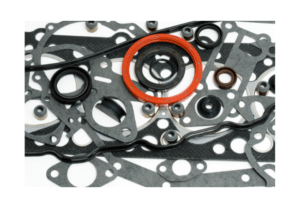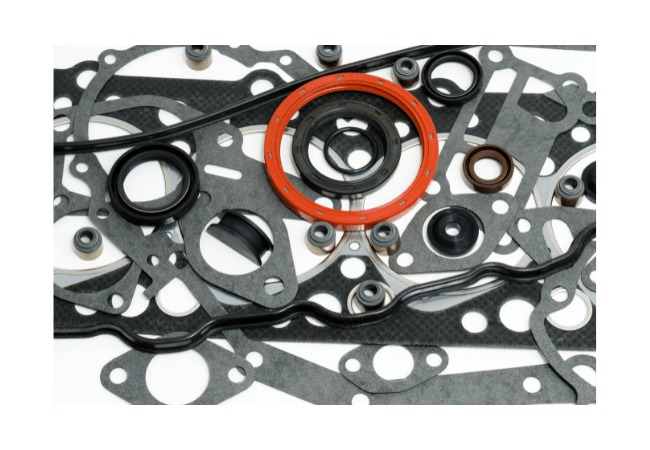An exhaust gasket is a component that seals the connection between the exhaust manifold and the rest of the exhaust system. Essentially, it acts as a barrier to prevent harmful gases from leaking out of the engine and into the environment. The gasket is typically made from durable materials like metal or graphite that can withstand high temperatures and pressure.
The importance of an exhaust gasket cannot be overstated. Without a proper seal, toxic gases like carbon monoxide and nitrogen oxides can escape from the engine and pose a serious health risk to both passengers in the vehicle and those nearby. In addition to safety concerns, a faulty or worn-out exhaust gasket can also negatively impact engine performance by reducing power output and fuel efficiency.
Regular maintenance and inspection of your vehicle’s exhaust system, including the exhaust gasket, is crucial to ensure it is functioning properly. If you suspect there may be an issue with your exhaust system, such as loud noises or unusual smells, it’s important to have it checked out by a qualified mechanic as soon as possible.
In this discussion, we’ve explored what is an exhaust gasket, its importance in preventing harmful gas leaks and maintaining engine performance, and why regular maintenance is necessary to keep your vehicle running safely. By understanding how this small but critical component works within your vehicle’s larger exhaust system, you can better appreciate its role in keeping you safe on the road while also maximizing your car’s performance capabilities. Remember – when it comes to automotive maintenance, every little detail counts.
Jump to
The Function of an Exhaust Gasket

The exhaust system is a crucial component of any vehicle. It is responsible for directing harmful gases produced by the engine away from the vehicle and out into the environment. The system typically consists of several parts, including an exhaust manifold, catalytic converter, muffler, and tailpipe.
As the engine burns fuel to produce energy, it also creates toxic gases like carbon monoxide and nitrogen oxides. These gases are expelled through the exhaust ports in the engine block and into the exhaust manifold. From there, they travel through the rest of the exhaust system before being released into the atmosphere.
An exhaust gasket serves as a seal between the exhaust manifold and other parts of the exhaust system. The gasket helps to prevent leaks in this connection point that could allow harmful gases to escape into the environment or even enter the cabin of your vehicle.
In addition to safety concerns, a faulty or worn-out gasket can also negatively impact engine performance by reducing power output and fuel efficiency. This is why it’s important to have your vehicle’s entire exhaust system – including its gaskets – inspected regularly by a qualified mechanic.
The role of an exhaust gasket within the larger context of an exhaust system cannot be overstated. Without a proper seal between components, toxic gases could leak out at any point along their journey through your car’s engine and out into the environment. In addition to posing a serious health risk, these leaks can also reduce engine performance over time.
By serving as a barrier between parts of your car’s exhaust system, an exhaust gasket helps ensure that everything works together smoothly and safely. Regular maintenance and inspection can help catch any issues with your gaskets early on before they become more serious problems down the line.
Types of Exhaust Gaskets
Graphite Exhaust Gaskets
Graphite exhaust gaskets are a popular choice for their ability to withstand high temperatures and pressures. They are made from expanded graphite, which is compressed into thin sheets that can be cut to fit a specific application. Graphite gaskets have excellent sealing properties and can conform to uneven surfaces.
One downside of graphite gaskets is that they can be brittle and prone to cracking under extreme conditions. However, many manufacturers offer reinforced graphite gaskets that are more durable and resistant to damage. Overall, graphite gaskets are a reliable option for high-performance engines.
Metal Exhaust Gaskets
Metal exhaust gaskets are typically made from stainless steel or other alloys that can withstand high temperatures and pressure. They are known for their durability and resistance to corrosion, making them a good choice for long-lasting performance. Metal gaskets come in a variety of shapes and sizes to fit different applications.
One potential drawback of metal gaskets is that they may not seal as well as other types of gaskets on uneven surfaces. This is because metal does not compress as easily as softer materials like graphite or composite. However, many modern metal gasket designs incorporate features like embossing or raised sealing beads to improve their sealing capabilities.
Composite Exhaust Gaskets
Composite exhaust gaskets combine the best qualities of both metal and soft material gaskets. They typically consist of layers of steel or other metals sandwiched between layers of softer materials like rubber, silicone, or fiber-reinforced materials. These multi-layered designs provide excellent sealing capabilities while also being able to conform to uneven surfaces.
Composite gaskets are often used in high-performance applications where reliability and durability are critical factors. They offer superior heat resistance compared with traditional soft material gaskets while also being more forgiving than solid metal options.
All three types of exhaust gaskets – graphite, metal, and composite – have their unique strengths and weaknesses depending on the specific application they’re being used in. It’s important to choose the right type of gasket based on your engine’s needs to ensure safe operation over time.
Common Issues with Exhaust Gaskets
Exhaust gaskets are designed to withstand high temperatures and pressure, but they can still fail over time. One common cause of exhaust gasket failure is age or wear and tear. Over time, the gasket can become brittle and crack, allowing exhaust gases to leak out.
Another cause of exhaust gasket failure is improper installation. If the gasket is not installed correctly or if the bolts are not tightened evenly, it can create uneven pressure on the gasket and cause it to fail prematurely.
Exposure to extreme temperatures or corrosive materials can also contribute to exhaust gasket failure. This is why choosing a high-quality gasket designed for your specific engine and driving conditions is important.
Several symptoms may indicate a failed exhaust gasket. One of the most common signs is a loud hissing or popping noise coming from the engine compartment or tailpipe. This noise occurs when exhaust gases leak out through a gap in the gasket.
Another symptom of a failed exhaust gasket is reduced engine performance. Leaking gases can reduce power output and fuel efficiency over time, leading to sluggish acceleration and poor gas mileage.
You may notice an unpleasant smell coming from your vehicle’s exhaust system if there’s an issue with the gasket. This could be due to leaking gases escaping into the cabin of your car.
Ignoring issues with your vehicle’s exhaust system – including problems with the exhaust gasket – can have serious consequences. In addition to reduced engine performance and poor gas mileage, leaking gases can pose a safety hazard by entering the cabin of your car.
Exhaust fumes contain toxic gases like carbon monoxide that can be deadly in high concentrations. Exposure to these gases can cause symptoms like headaches, dizziness, nausea, and even loss of consciousness.
In addition to safety concerns, ignoring issues with your vehicle’s exhaust system can lead to expensive repairs down-the-line as other components become damaged due to prolonged exposure to excessive heat or corrosive materials.
It’s essential to address any issues with your vehicle’s exhaust system as soon as possible to prevent further damage and ensure safe operation over time.
Installation and Maintenance of Exhaust Gaskets
Proper installation of an exhaust gasket is critical to ensuring reliable performance and preventing premature failure. The first step in installing a new gasket is to thoroughly clean the mating surfaces on both the engine and exhaust pipe. This will help ensure a tight seal and prevent leaks.
Next, it’s important to select the right type of gasket for your specific application. Make sure to choose a gasket that’s designed for your engine make and model, as well as the type of exhaust system you have.
When installing the new gasket, make sure to tighten the bolts evenly and according to manufacturer specifications. Uneven pressure can cause the gasket to fail prematurely or even crack over time.
Be sure to check for any signs of leaks or damage after installation. If you notice any issues, address them promptly before they worsen.
Regular maintenance is key to ensuring long-lasting performance from your vehicle’s exhaust system. One important maintenance task is checking for signs of wear or damage on your exhaust gasket. Look for cracks, corrosion, or other signs of wear that may indicate that it’s time for a replacement.
Another important maintenance task is cleaning your exhaust system regularly. Dirt and debris can accumulate on your exhaust pipes and muffler over time, leading to corrosion or other issues that can affect performance.
Finally, be sure to have your vehicle inspected regularly by a qualified mechanic. They can help identify any potential issues with your exhaust system before they become major problems.
Common Repairs for Exhaust Gaskets
Several common repairs may need to be performed on an exhaust gasket over time. One common repair is simply replacing the old gasket with a new one when it becomes worn or damaged.
In some cases, however, more extensive repairs may be needed if there are issues with other components in your vehicle’s exhaust system. For example, if there’s a leak in one of the pipes or mufflers due to corrosion or damage, these components may need to be replaced as well.
Additionally, if there’s excessive heat buildup in your vehicle’s engine compartment due to issues with the catalytic converter or other components in the emissions control system, this can put extra strain on your exhaust gasket and cause premature failure.
Proper installation procedures and regular maintenance are critical factors in ensuring reliable performance from your vehicle’s exhaust system over time. And while some repairs may be necessary from time to time due to normal wear-and-tear or other issues, addressing them promptly can help prevent more serious problems down the line.
Significance of Exhaust Gaskets
Exhaust gaskets play a critical role in ensuring proper performance and safety from your vehicle’s exhaust system. They create a seal between the engine and the exhaust pipe, preventing harmful gases from leaking into the cabin of your car.
In addition to safety concerns, exhaust gaskets also help improve engine performance by ensuring that exhaust gases are properly routed through the emissions control system. This helps reduce emissions and improve fuel efficiency over time.
High-quality exhaust gaskets can also help reduce noise levels from your vehicle’s exhaust system, providing a quieter and more comfortable driving experience for you and your passengers.
Final Thoughts
Proper maintenance and installation of your vehicle’s exhaust gasket are essential to ensure reliable performance and safe operation over time. By selecting the right type of gasket for your specific application, following proper installation procedures, and performing regular maintenance tasks like cleaning and inspection, you can help extend the life of your vehicle’s exhaust system.
Additionally, it’s essential to address any issues with your vehicle’s exhaust system promptly to prevent further damage or safety hazards. If you notice any unusual noises or smells coming from your car’s exhaust system, be sure to have it inspected by a qualified mechanic as soon as possible.
Exhaust gaskets may seem like a small component in your vehicle’s overall performance, but they play a critical role in ensuring safe operation and reliable performance over time. By understanding their significance, following proper installation procedures, performing regular maintenance tasks, and addressing any issues promptly when they arise, you can help ensure that your vehicle runs smoothly for years to come.

My name is Tom Harris, founder of this blog. I’m a mechanical engineer with 20 years of experience in the automotive industry. I’m here to help you with your vehicle’s problems, easy fixes and share my insights and experience so that you can enjoy your rides more.

